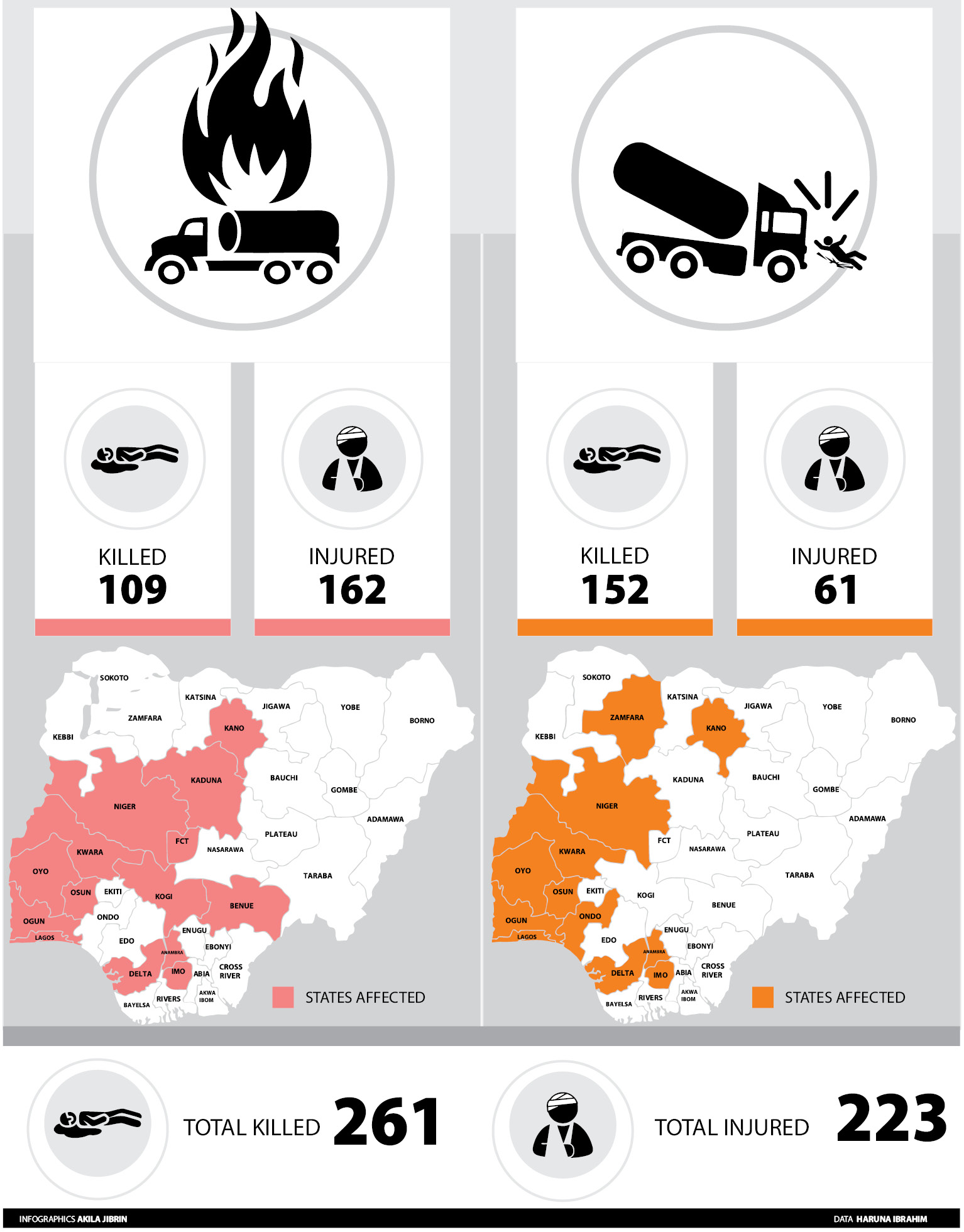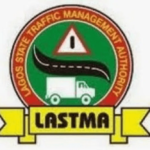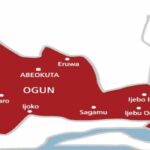In the past one year (August 2020 to August 2021), at least 261 people have died from 60 separate truck accidents and tanker explosions across Nigeria, findings by Daily Trust have shown.
Reported cases compiled by our reporter also showed that 223 people were injured within the same period.
Between August and December 2020, 62 people were killed while 26 were injured. In 2021, from January to August, 90 people were killed while 35 were also injured. In one year, 152 people were killed in truck accidents while 61 were injured.
In the 31 reported cases of tanker explosions between August 2020 and June 2021, 109 people were killed while 162 were injured.
Also, data received from the Federal Road Safety Corps (FRSC) showed that between August 2020 and June 2021, 1,070 crashes involving articulated vehicles, comprising 378 tankers and 792 trailers, occurred.
Findings by Daily Trust also showed that 111 vehicles were burnt in the explosions. Fifty-five shops and 84 houses were burnt across some states. Lagos has the highest number of incidents with seven cases, which led to the loss of 14 lives and left 45 with injuries, while 47 vehicles were destroyed in the explosions.
Eleven motorcycles and three tricycles were lost to the fire. Many valuables were also lost to the incident but not adequately reported as some reports did not capture the number vehicles, houses and other property burnt.
It was discovered that some of these incidents occurred at commercial centres, where occupants lost either part or their entire businesses.
Red spots
Last Monday, a truck rammed into a building at Imepe, Ijebu-Ode in Ogun State killing a woman and her daughter, as well as a motorcyclist.
The Lagos-Ibadan expressway is prominent for tanker explosions. Among the compiled reported cases that shook the country was the Liquefied Petroleum Gas (LPG) tanker explosion at the Mobolaji Bank Anthony Way, Ikeja, where 13 persons were injured and 25 cars destroyed in June 2021. Nine persons died from the fire.
Also, in another tanker explosion on the Lagos–Ibadan expressway in the same month, two lives were lost and 13 vehicles burnt.
Due to the reoccurring cases of road crashes involving articulated vehicles, some state governments have introduced a policy restricting their movement.
Lagos State started the implementation of the restrictions of containerised trailers and trucks between 9pm and 6am in January.
Elshewhere in Benue State, two tanker explosions occurred in Oshigbudu-Obagaji junction in Agatu Local Government Area in three days. The incidents led to the death of 13 people and the destruction of over 50 houses.
Another incident with high casualties was the Felele tanker explosion in September 2020. The incident led to the death of 23 people, while five cars, two motorcycles and three tricycles were destroyed. Among the victims of the Kogi petrol tanker explosion were pupils, mothers and students of the Kogi State Polytechnic.
A utility long truck in June 2021 rammed into a 14-seater commercial bus, killing three passengers while negotiating a bend in Obio Akpor Local Government Area of Rivers State. Also, in July 2021, a truck rammed into the Akpajo bridge in Eleme Local Government Area.
Furthermore, among truck accidents with high casualties was the one at Nkwommiri market in Umuozu village, Imo State, where 10 people were killed when a driver lost control and ran into the market.
Also, 10 traders were killed in Ibadan in a similar manner after a tanker ran into a market after the driver lost control of the vehicle.
Rising cases of accidents worry residents
Among the people that witnessed the Ibadan accident was Mrs Adekemi Adegoke Alawuje, who said she escaped by the whiskers as the truck drove past her before the mayhem. She saw four people crushed by the vehicle. One of the victims was Barakat Adediran, who was preparing to commence her Higher National Diploma at The Polytechnic, Ibadan.
Her brother, Adegoke Fajaye, said Barakat was caught in a web of cables pulled down by the truck while she was trying to escape. He said the cable held her while the truck ran over her.
Her mother, Alhaja Fausat Adediran, said the incident happened after Barakat alighted from the motorcycle that took her to the market. She said both her daughter and the motorcyclist were killed.
Another witness, Mojere Adeniyi, said a woman lost her two children in the incident.
An Abuja resident, Isochukwu Joseph, who lost his brother to an accident in Ondo State, en route Lagos in 2020, said the number of accident victims reported in the news was very few.
“My brother was missing for some days before we got to know about the incident and found him in the mortuary. He was going to Lagos when it happened,” he said, adding that his loss, though painful, was nothing compared to those killed by trucks or tanker explosions.
“The victims were people going about their businesses. Imagine someone just walking along the way or looking for his daily bread and a truck would run him over. How would you reconcile the cases of people struggling to sell their wares but lost their lives in a market?
“There were cases where trucks rammed into houses and either killed or injured the occupants. It is a terrible situation. Nobody deserves to die from these truck accidents and tanker explosions,” he added.
Joseph said there should be a stiffer control mechanism for drivers of articulated vehicles to ensure the safety of Nigerians.
“I saw a video on the social media of a 13-year-old boy who was driving a truck. The person that posted the video drove past the boy and had to park to record the video. The boy told him that he was 13 years old. I was shocked; and if you saw the video, the boy drove the truck and barely stopped to answer the man. Why should that boy drive? Who gave him the truck to drive?
“You see, so many things are not working because some people have failed in their responsibilities; then we start blaming the government. We all have to take responsibility. Some of these truck drivers are reckless and callous and this should not continue. Most of them do not observe speed limit and do not reduce their speed while driving through residential areas and markets,” he further said.
Some road users in Port Harcourt, Rivers State, also identified reckless driving among the factors responsible for the crashes.
A motorist, Paul Nwake, said drivers of the trucks should be blamed for the frequent accidents.
“Most of the truck accidents that occur on our roads are caused by reckless drivers. Many of them are under the influence of drugs and alcohol and care less about other road users,” he said.
He called on FRSC to set up a control and monitoring system that would regulate the activities of truck drivers.
An official of the National Union of Road Transport Workers (NURTW) in the state, Okey Onu, blamed frequent truck accidents on the poor state of roads in the country.
“Our roads are in a terrible state, which is responsible for the frequent truck accidents,” he said, adding that there is the need to rehabilitate them.
The public education officer of the Federal Road Safety Corps (FRSC), Assistant Corps Marshal Bisi Kazeem, said they were broadening the scope of sensitisation to change bad driving behaviours and introduce result-oriented policies, particularly those that would eliminate speed-related crashes since it had been the major cause of accidents.
Taiwo Adeniyi, Maureen Onochie, Haruna Ibrahim (Abuja) & Victor Edozie (Port Harcourt)

 Join Daily Trust WhatsApp Community For Quick Access To News and Happenings Around You.
Join Daily Trust WhatsApp Community For Quick Access To News and Happenings Around You.


